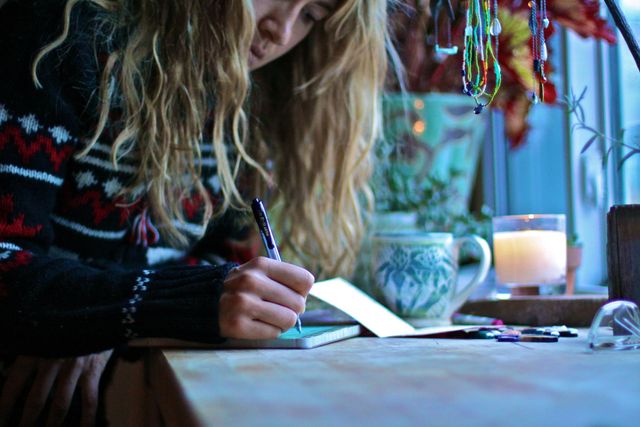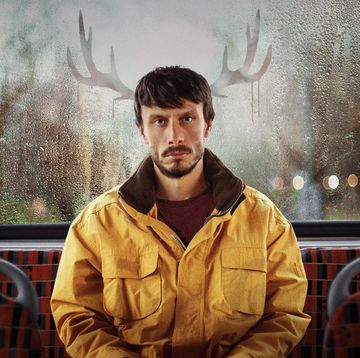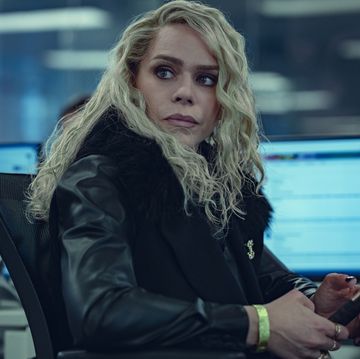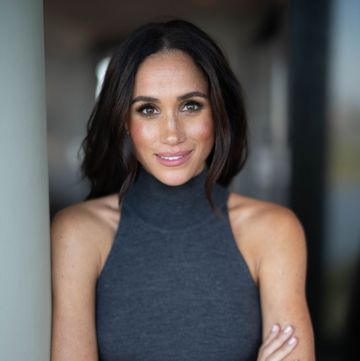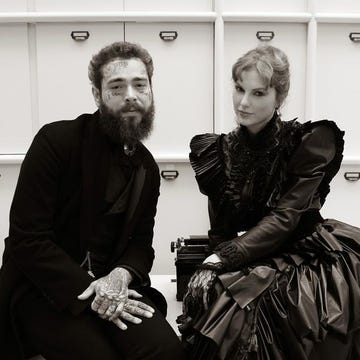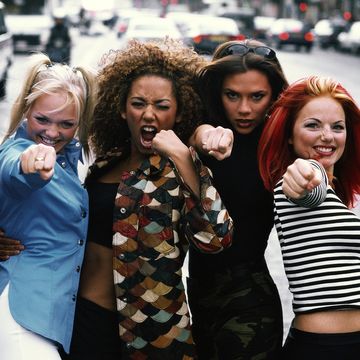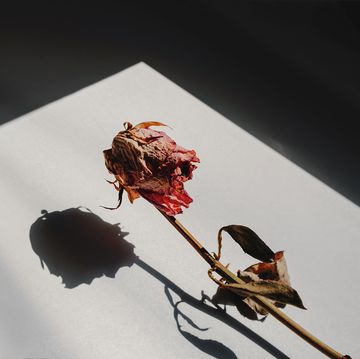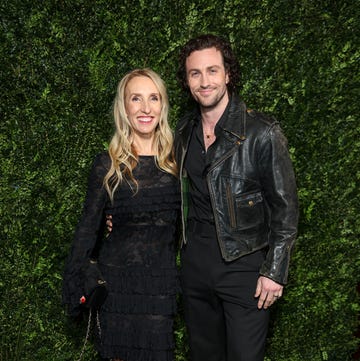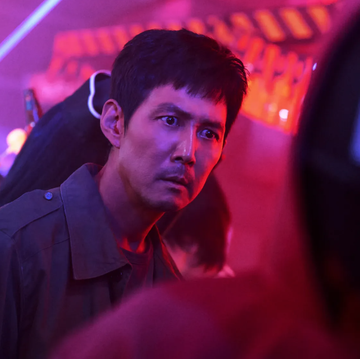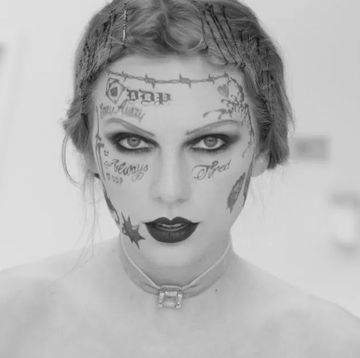It's 4 a.m. and I'm somewhere I don't recognize, head throbbing, face down in a pile of vomit. No, I'm not reliving that one semester in college I decided to act my age. I'm a grown-ass 35-year-old, in a secluded cabin in Minnesota, twelve-and-a-half miles from civilization. Twelve-and-a-half miles from another human being wanting or needing a damn thing from me. No work, no schedule, no obligations or phones ringing — or assignments due, or anyone telling me what to do with my time. Zero expectations, dead silence. Just me on a gorgeous fog-drenched spring morning by a giant gorgeous cabin on a giant gorgeous lake. It is (vomit notwithstanding) any normal human being's dream.
And my fucking nightmare.
As a woman who's managed chondrosarcoma, a rare form of bone cancer, for the last five years, I am intimately familiar with nightmare scenarios. Cancer cost me my immune system, my hair, a fourth of my tibia, a good portion of my bank account, two friendships, one knee (replaceable), and one functioning kidney (not so replaceable). But it never cost me my job. Through five years of clinical trials, chemotherapy, radiation, PET scans, and surgeries, I maintained my career as a television writer. I was fortunate enough to have incredible bosses on both shows where I worked — "The Vampire Diaries" and "Grey's Anatomy" — who made it clear from moment one: I didn't have to work while I was sick. I could take time off, take care of myself however I needed. My bosses assured me my job wasn't going anywhere. But I was adamant that the best way to take care of myself was to Never. Stop. Working.
So I didn't. I kept working because I couldn't "let cancer win." I had my dream job — making an actual living as a television writer. No way in hell cancer was going to derail me. More importantly, going to work every day filled me with a sense of purpose, a reason not to succumb to the fevers and nausea and tremors. Why worry about test results and failing chemo regimens when you can obsess over smoking hot vampires and life-saving, bed-hopping doctors? Screw my balding head and bruised veins. Who cared about the blinding headaches or my eyelashes falling out during lunch breaks? Work felt right. Healthy, even. So I kept going. For three years straight.
Everyone called me Amazing. Brave. Badass. Those three words followed me to every chemo appointment, every PET scan, every work deadline. And the sicker I got, the more they said it. They said it so much, I started to believe it myself. Believed it so hard that I signed up for more. Another script? Bring it. Twenty-four hour playwriting challenge? Done. Speaking engagements at medical conferences? Yes, please. I couldn't get enough.
Nearly one full season into "Grey's Anatomy," and three years into cancer treatment, my scans revealed that the experimental chemotherapy was finally doing its job. I was far from being healthy and cancer-free: My immune system was obliterated, my face was bloated from steroid injections, and my legs still went numb on occasion from the stubborn cluster of cancer cells sitting on the base of my spine. But I was out of the deep dark cancer woods.
I sat down in front of Shonda to tell her the good news. She congratulated me. Told me I was Amazing. Brave. Badass — and then she sent me home. "Grey's Anatomy" still had six weeks left of work to do but she insisted I was done for the season. Effective immediately. I shook my head, "Hell no. Respectfully. Hell fecking no." I was too tired from the chemo and the joy of being able to finally stop taking chemo that I didn't notice I'd just said "no" straight in my boss's face. But my work was at stake. My lifeline. I was determined not to lose it. Not when I was finally getting better. I backpedaled, told her thanks, but no thanks. I'd hate to stop. I didn't want to stop. I couldn't stop.
She stared at me knowingly, then stood up and told me she wasn't asking. My job would be waiting for me when next season started, but, for now, she insisted, "Go home." I instantly, desperately started pitching her compromises — half-days, four-day-weeks, writing from home. She didn't respond. She simply went back to her desk and back to work. The meeting was over.
For the first full week off I drove to my office each morning. I knew better than to try and go in, but I couldn't break the habit. Instead, I sat in nearby breakfast nooks and dingy bars, crafting lengthy emails convincing Shonda to let me come back. I composed pragmatic letters showcasing my improved lab work. Attached articles proving that productivity can increase our immune systems. On my darker days, I wrote desperate pleas, playing every cancer card I could. I sent none of them.
I realized as long as I was in Los Angeles, I couldn't accept my work-free fate. A friend offered up his cabin in Minnesota. No snow, no mosquitoes, and all the leaves and peace and quiet I could imagine. I'd always fantasized about going, but never had the time. Now, time was all I had. Five full weeks of it. So I flew to Minnesota, grabbed a few six-packs and a stack of frozen waffles, drove three hours straight to the middle of nowhere cabin, and immediately plopped myself on the edge of the dock, laptop in hand. I was forbidden to step foot in my office, but no one could stop me from working, from doing the one thing I was certain kept me alive.
I wrote on that edge of that dock nonstop. Wrote until my fingers swelled and the sun started slinking down behind the trees. Wrote until the light of my computer dimmed to nothing, and I had no choice but to go inside to power up for another round. But as I stood up to go, my legs went numb, buckling beneath me. And I face-planted right between two slats of the wooden dock — my laptop sailing straight into the water. I dove in, bloody face first, to save it.
It was pointless. By the time I fished my computer out, it was drenched in muddy lake water. Blank. Ruined. Unrecoverable. I pulled myself up onto the dock in the dark and lay there sopping wet, bleeding, and utterly pathetic.
And that's when it hit me. The abject terror. Bigger than any MRI machine I'd been jammed into for hours at a time. More terrifying than the biopsy results and the experimental drugs and the looks on the faces of every damn person I loved when I said the word cancer. When I was working, I didn't have time to let the word cancer sink in at all. I didn't have the energy to obsess over dwindling treatment options and god-awful statistics on the internet. Mounting deadlines were far easier to focus on than the fact that my body was failing on every level.
As long as I was writing, I could delude myself into thinking I had any control at all over whether I lived or died. Now I had no work, no deadlines, no expectations to meet. Nothing left to distract me from the fear and grief I'd been running like hell from for three years straight. For the first time in my life, there was nothing I could do but feel it.
I felt it all over the damn place, sobbing, howling like a crazed animal in the dark. I vomited until my insides felt raw. I couldn't move, could barely breathe. So I just lay there, howling and sobbing, until I exhausted myself to sleep.
The next morning, as the 4 a.m. fog rolled in, I stirred awake. My head throbbed. I sat up slowly, shivering in the cold, trying to remember how the hell I got here — and that's when the shame washed over me. Not because I was a sad, bloody, vomit-covered human. But because it took me so damn long.
My desire to keep working at all costs was never amazing or brave or badass. It was Reckless. Stubborn. Stupid.
But I also realized I wasn't alone. How many times had I watched co-workers show up to the office with miserable colds that turned into bronchitis that turned into pneumonia? How many of my family members had delayed crucial doctors appointments or pushed through injuries to impress investors or make the Big Presentation?
Instead of asking for and even demanding what we need, we soldier up, play the game, power through. Our flu-ridden or tumor-growing bodies are celebrated for it. And we're often made sicker in the process.
That afternoon, I stared out at the lake and dared myself to break the cycle, dared myself to sit still at that cabin. Dared myself to admit I'm sick — and that it was time to take a break.
It was harder than it should've been. Harder than anything cancer ever threw at me. But I did it anyway. In the silence, I wondered what would happen if we redefined brave? What if taking meds and going to the doctor was considered amazing? What if drinking fluids and saying no and resting and doing all the things that don't land you in a hospital or face down in lake vomit was badass?
I realized I was in a position of enormous privilege. I had the full support of my bosses and co-workers. Taking time off wouldn't have cost me my job or compromised my long-term career. Putting my health first wouldn't have jeopardized my salary or health insurance. I was one of the lucky ones. Yet I took that for granted. And if people who are in positions of privilege don't take the time off when they need it, we are sending the message that there's really no need for sick time at all.
Five weeks later, when the new season of "Grey's Anatomy" began, I returned to the writing staff. My immune system was in the "normal" range. My hair was growing back, my face was the size of an actual face, my kidney functioning like an actual kidney again. I was not completely healed. I was not cancer-free. (I may never be.) But I was the strongest I've ever been. My co-workers kicked off our first day back by asking how my "Relax Break" was. I paused for a moment, a wave of embarrassment rising in me. And then I realized: There was no judgment in their voices, only gratitude that I was genuinely better than when I left them. And with that, our day began. I flipped open my new laptop and got back to work as if I was never gone.
Now when I hear stories or read articles of people who are sick or grieving but show up and do their job as if nothing's wrong, I don't find them amazing at all. I worry. I wonder. I want so badly to tell them how brave and badass they'd be if they'd just…stop.
Then again, as I finish writing this, I'm home in bed, in my pajamas, nursing a kidney stone the size of a newborn's fist. But, hell, at least I stayed home.
Baby steps.
Elisabeth R. Finch is a television writer, playwright, and essayist. She is currently writer/Co-Executive Producer on Grey's Anatomy. Her past television credits include True Blood and The Vampire Diaries.
